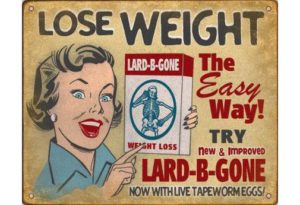
There are so many diets out there – drinking dirty bathwater, swallowing tapeworms and inserting yogurt enemas – each claiming its own miracle cure for weight worries and disease distress. But does this display a genuine concern for one’s health?
Most people try and fail at some kind of New Year’s resolution, and most of these are connected to ways in which we want to improve our health – generally diet or exercise. Wreckage of our best intentions are visible in a garage or spare bedroom full of dumbbells, overpriced running trainers, and cross-training machines.
Quick fix diets abound:
- the Dukan diet
- the Beverly Hills diet
- the cabbage soup diet
- the KE diet
- the Banting diet
- the blood type diet
- the low sulphur diet
- the juice diet
- the cleansing detox diet
- the high protein diet
- the low salt diet
This concern about weight and diet is nothing new:
- In 1087, William the Conqueror was already morbidly obese and decided to fight his own battle of the bulge with an alcohol-only diet. Big Bill took to his bed and refused everything but liquids until he had shed the pounds. Ironically, this didn’t really do him any health favours as later that year, when he’d lost enough weight to get back on his horse, he was thrown from his trusty steed, ruptured his gut, and died in agony. He was still so large, his body had to be wedged into the stone coffin.
- In 1760, Dr Flemyng’s soap diet recommended eating soap to shed the pounds. Flemyng reasoned that as soap removed fats and oils from clothes it could also wash away excess fat from inside the body. His patients were told to eat soap made from alkaline salt, oil and fat dissolved in quicklime and water. When soap diet devotees complained that they were just as fat as they were when they started the diet (though hopefully somewhat cleaner), he insisted they must be eating the wrong soap or in the wrong amount.
- In the 18th century, the Bath water diet attracted thousands to spa towns in order to ‘take the waters’. And this was not just bathing in the mineral-rich baths, it also involved quaffing back gallons of unfiltered water that hundreds of other people have sweated and stewed themselves in each day.
- In 1810, the Vinegar Diet of British surgeon William Wadd (1776-1829) was published in his ‘Cursory Remarks on Corpulence’. Drinking large quantities of vinegar would supposedly dissolve fat. The poet Lord Byron (1788-1824) was an advocate of this particular diet plan as he was morbidly fixated with his weight and had yoyo dieted all his life. Records show in 1806 he weighed 13st 12lb (88kg), but by 1811 Byron weighed under 9st (57kg). In order to purge his body and melt away fat, not only would Byron drink vinegar each day, but he restricted solid foods to potatoes – soaked in vinegar. And the vinegar diet still does the rounds of the “out there” diets to this day.
- In 1863, the first low-carbohydrate diet book ‘Letter on Corpulence, Addressed to the Public’ was written by William Banting. Meat for breakfast, lunch and dinner. The original Banting diet forbade complex carbohydrates, beer, starchy fruit and veg and dairy, but lean protein, eggs, and the odd sherry with a claret chaser were fine.
- At the start of the the 20th century, John Harvey Kellogg (1852-1943), of cornflake fame, manufactured plain cereals to suppress sexual urges. The so-called “masturbation diet” not only promised to improve health, aid digestion and regulate weight, but it would also stop you masturbating. Kellogg (and many other doctors) argued that masturbation caused ‘cancer of the womb, urinary diseases, nocturnal emissions, impotence, epilepsy, insanity, and mental and physical debility’. He reasoned that spicy, ‘exciting’ food, overly stimulated the senses, therefore the plainer your diet the less inclined you would be to give yourself a treat. Yoghurt enemas were also encouraged by Kellogg, who actually invented a machine to administer such enemas to his patients. The latter dietary innovation never really caught on the way cornflakes did.
- In the late 19th century, Horace Fletcher was a great proponent of the mastication diet where you were required to chew each mouthful of food 100 times. The theory was that the food would become liquefied, which meant the chewer wouldn’t overeat and the mush would be easier to digest. Fletcher claimed his method of eating produced stools “with no stench, no evidence of putrid bacterial decomposition, only with the odour of warm earth or a hot biscuit”. Apparently, Fletcher carried around a sample of his own faeces to back up this claim should anyone challenge him on this point. He became known as ‘the Great Masticator’, although I imagine there were variations of this nickname.
- In the 1920’s, ‘obesity soaps’ were produced by companies in London. This more recent version of s soap diet ony promised that internal fat would dissolve if people washed with i. Luckily, eating it was not necessary this time round.
And there are many, many more diets throughout history which have tried to help with a seemingly insatiable public appetite for weight-reduction and improved health through dietary interventions – smoking yourself to thinness, taking vast quantities of speed, dosing up on sugar, using radium, eating nothing but cabbage, fish, milk or eggs – even taking arsenic to shed those extra pounds.
We can all laugh at historical diets, but there are few signs in the 21st century of a slowing-down in similar attempts to achieve optimal weight and health (with minimal effort). The internet is awash with dodgy diet pills and pseudo-scientific weight loss advice (tried the zodiac diet lately?).
It appears that if a media-reported “scientific study” told us that by drinking a bottle of grimy, slightly hairy bathwater we would definitely lose weight, some people would actually try it – you know they would! I mean, Beyoncé once advised us to eat nothing other than maple syrup and Reese Witherspoon advocated eating a diet consisting solely of baby food.
This obsession with diet can be viewed as an indication of a fundamental human desire to be healthy.
I can get annoyed at how so many companies and individuals make profits out of peddling diets that will eventually fail; but it makes me sad that the only thing people need to do in order to achieve optimal health and ideal body weight is to eat what all the healthiest human populations have always eaten – a diet largely or completely consisting of whole plant foods.
Sometimes the most obvious solution can be the most difficult to swallow…
